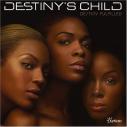
mean girls ruled in 2004
This is something that has been on our mind for a while. There's been plenty of coverage in recent years of the so-called phenomenon of "mean girls." Lotsa books, including Queen Bees and Wannabes (the inspiration for the movie Mean Girls) and Odd Girl Out. These books seem markedly different from the mid-90s release Schoolgirls by Peggy Orenstein. Instead of focusing on the so-called "confidence gap," the more recent books tend to explore what I think of as girl "in-fighting." Quite frankly, I find this turn troubling.

spice was nice in the 90s
Let me digress for a moment by noting a trend that seems to parallel the media attention devoted to "mean girls." This would be the trend of "girls gone wild" and "hot girl on girl action." I'm not saying these are new ideas, but rather that their acceptance into mainstream culture is new, and it's a whole nasty set of contradictions that's made them "acceptable."
On the first episode of the latest season of The Real World for example, two of the female roommates make out in the hot tub as their male roommates look on with giddy disbelief. In the last season of The Gilmore Girls when Rory and Paris run into former classmates Louise and Madeline while on spring break, they learn that their old chums have taken to making out with one another as a way to gain entrance to parties, attract men, and score free booze. Paris Hilton's sidekick contained multiple pictures of her topless and kissing a female friend. Episodes of "The fifth wheel" have shown girls getting cozy in the "private booth" (the one with a camera, though they do blur out the nipples). Suddenly, in a country where the majority of people are opposed to gay marriage, there are women making out everywhere. Contradiction? Not really. The women in the above situations appear to make out not for their own pleasure, but for those (mainly men) around them. Sometimes they profit from these efforts, but only if their "performance" somehow takes place within the bounds of heterosexuality. And performance like this isn't new (especially in non-mainstream media) ; but it is new on prime time television. As long as some guy gets a boner (and in the case of Girls Gone Wild, $$$. I mean, I don't think those "wild girls" are compensated), that's okay. But I digress (more on this in a later post). My point is that this performance exists (and works) within the context of a sexist and capitalist sentiments and motivations. And of course the same outcome (or, er, "rewards"????) are not in store for most lesbian couples.
On the first episode of the latest season of The Real World for example, two of the female roommates make out in the hot tub as their male roommates look on with giddy disbelief. In the last season of The Gilmore Girls when Rory and Paris run into former classmates Louise and Madeline while on spring break, they learn that their old chums have taken to making out with one another as a way to gain entrance to parties, attract men, and score free booze. Paris Hilton's sidekick contained multiple pictures of her topless and kissing a female friend. Episodes of "The fifth wheel" have shown girls getting cozy in the "private booth" (the one with a camera, though they do blur out the nipples). Suddenly, in a country where the majority of people are opposed to gay marriage, there are women making out everywhere. Contradiction? Not really. The women in the above situations appear to make out not for their own pleasure, but for those (mainly men) around them. Sometimes they profit from these efforts, but only if their "performance" somehow takes place within the bounds of heterosexuality. And performance like this isn't new (especially in non-mainstream media) ; but it is new on prime time television. As long as some guy gets a boner (and in the case of Girls Gone Wild, $$$. I mean, I don't think those "wild girls" are compensated), that's okay. But I digress (more on this in a later post). My point is that this performance exists (and works) within the context of a sexist and capitalist sentiments and motivations. And of course the same outcome (or, er, "rewards"????) are not in store for most lesbian couples.

rock sistas sleater-kinney
But back to "mean girls." I worry that this recent interest in the "catty" and "aggressive" and "nasty" behavior among teen and tween girls neglects to analyze the context for this behavior. That is to say, it doesn't really ask why girls behave this way as much as it describes the things these girls do. Drawing on my own experience in middle and high school, and the social climates that I've observed among the students in these age groups with whom I've worked, its clear to me that attention from boys is one of the ways girls have access to power. It is also clear to me that girls are not mean to one another outside the context of a contest for power (raise your hand if you hate contests!). Even so-called "ana" (anorexia) clubs are basically girls competing to be thin ...probably because our culture rewards thinness. (I hate that the major contests young girls might be devoting their energy to revolve around boys and thinness. yuck.)
Anyway, women still only make .77 to every $ made by a men. And high-powered corporate positions are still dominated by men (though this is changing). And there still hasn't been a woman president. And when you watch c-span it still seems to be a whole lot of dudes. And that whole equal rights amendment thing never happened. Sooo . . . yeah, we still have a ways to go. My hunch is that young girls are sensitive to this. My hunch is that they get an idea that there isn't as much room at the top for women. So it seems quite possible that girls might turn on one another because they are cognizant of this inequality. And when you're young, the idea of challenging the status quo isn't as powerful as that whole "fitting in" one. And of course boys don't have to worry about this. There are lots of powerful men everywhere they look. I find it hard to believe that children don't register this inequality. I think "mean girls" are a symptom / result of this sensitivity.
I worry when I hear people sigh, "girls are mean." I worry that this is being treated as a "fact" rather than a condition or a symptom that can and should change. It also seems important to ask if anyone benefits from girls being mean to each other. I mean, if girls are mean to each other, they are less like to challenge the privileges their male classsmates enjoy. And if girls are mean to each other, they are less likely to disrupt the whole status quo.
And then there's this whole idea that men like mean girls. Most people agree that men like watching girls fight (and how far away is a catfight from "hot girl on girl action"?). Wasn't there that joke on Friends -- the one where Joey says guys like watching girls fight because the guys are hoping the girls might accidentally kiss? This joke works because it makes the girl fight into something men enjoy -- it turns the girl fight into something that gratifies men. And that's totally non-threatening (to men).
And what happens when girls are not mean to each other? It seems to me that the whole "sista solidarity" thing is something that clearly makes some men uncomfortable. Perhaps because female friendship and "sisterhood" is something that they can't control. And mainstream culture has yet to embrace lesbians, perhaps because the lesbian relationship renders men obsolete.
Anyway, women still only make .77 to every $ made by a men. And high-powered corporate positions are still dominated by men (though this is changing). And there still hasn't been a woman president. And when you watch c-span it still seems to be a whole lot of dudes. And that whole equal rights amendment thing never happened. Sooo . . . yeah, we still have a ways to go. My hunch is that young girls are sensitive to this. My hunch is that they get an idea that there isn't as much room at the top for women. So it seems quite possible that girls might turn on one another because they are cognizant of this inequality. And when you're young, the idea of challenging the status quo isn't as powerful as that whole "fitting in" one. And of course boys don't have to worry about this. There are lots of powerful men everywhere they look. I find it hard to believe that children don't register this inequality. I think "mean girls" are a symptom / result of this sensitivity.
I worry when I hear people sigh, "girls are mean." I worry that this is being treated as a "fact" rather than a condition or a symptom that can and should change. It also seems important to ask if anyone benefits from girls being mean to each other. I mean, if girls are mean to each other, they are less like to challenge the privileges their male classsmates enjoy. And if girls are mean to each other, they are less likely to disrupt the whole status quo.
And then there's this whole idea that men like mean girls. Most people agree that men like watching girls fight (and how far away is a catfight from "hot girl on girl action"?). Wasn't there that joke on Friends -- the one where Joey says guys like watching girls fight because the guys are hoping the girls might accidentally kiss? This joke works because it makes the girl fight into something men enjoy -- it turns the girl fight into something that gratifies men. And that's totally non-threatening (to men).
And what happens when girls are not mean to each other? It seems to me that the whole "sista solidarity" thing is something that clearly makes some men uncomfortable. Perhaps because female friendship and "sisterhood" is something that they can't control. And mainstream culture has yet to embrace lesbians, perhaps because the lesbian relationship renders men obsolete.
I'm just sayin'.

we love our sistas
1 comment:
The Original "Mean Girl" movie? **Heathers**! I watched that film like, dozens of times when I was a teen.
Post a Comment